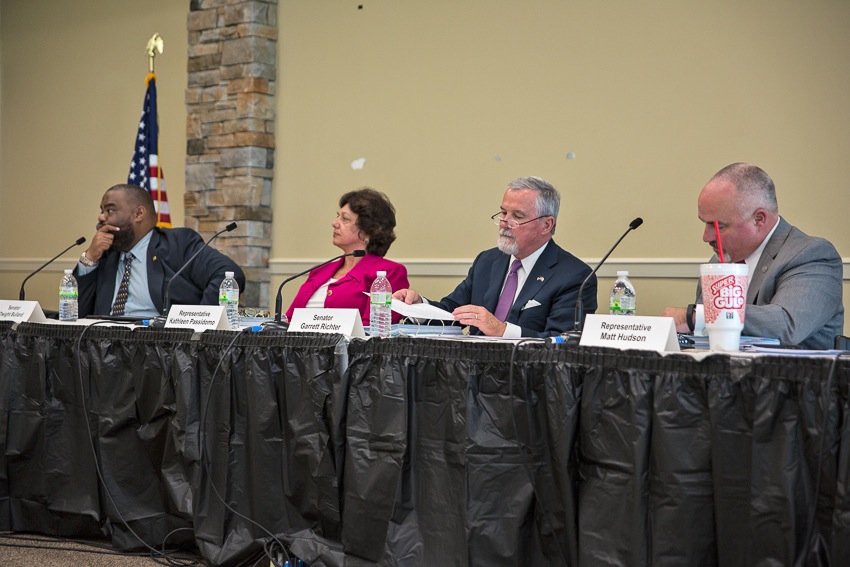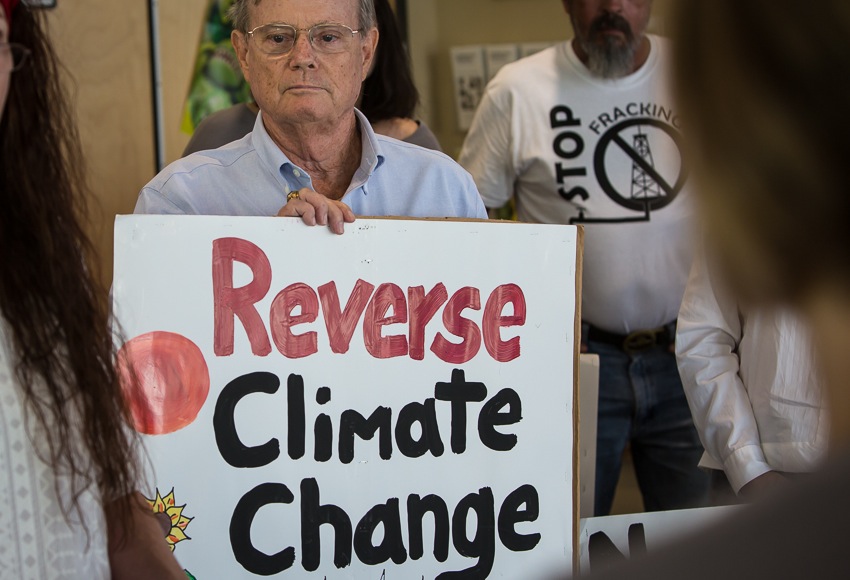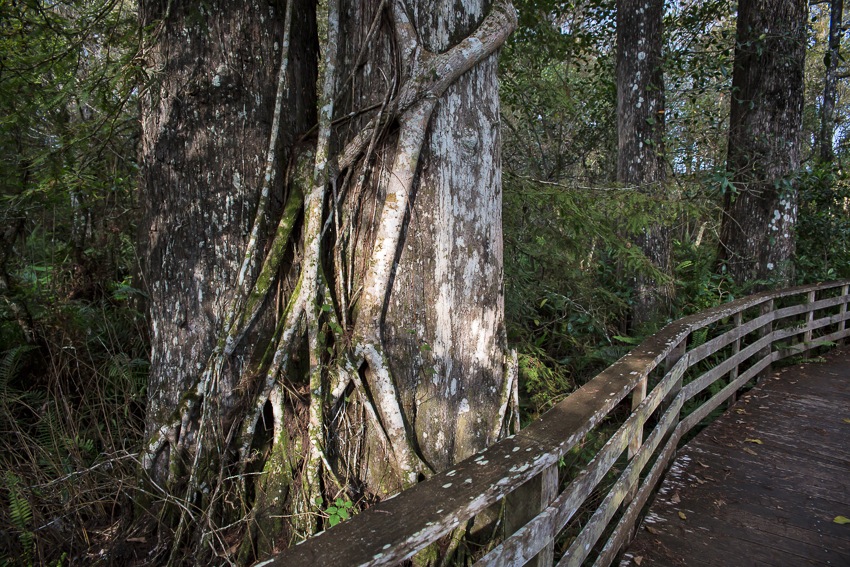The battle to keep Florida frack-free is intensifying ahead of the 2016 state legislative session.
Fracking became an issue last year after Florida’s Department of Environmental Protection (DEP) revealed that the Dan A. Hughes Co. had fracked the Collier-Hogan well in Naples, despite regulators telling it not to until the agency had a chance to thoroughly review the company’s plans.
Shortly after the news broke, the move to ban fracking in Florida began.
Democratic State Senators Dwight Bullard and Darren Soto filed Senate Bill 166 that called for a statewide ban on fracking. Their bill failed, but was reintroduced this year.
In July, Bonita Springs, a city near Naples, passed a ban on all types of well-stimulation techniques, including fracking. Nearby Estero is considering a ban as well.
In a move that would void existing bans, companion legislation sponsored by Republican State Senator Garrett Richter (SB318) and Republican State Representative Ray Rodrigues (HB 191) calls for statewide regulations for fracking. The bills, if passed, would preempt all local ordinances governing the oil and gas industry.
Collier County legislative delegation on October 15 in Naples. ©2015 Julie Dermansky
On October 15, the public had an opportunity to address a Collier County legislative delegation on the bills meant to govern the fracking industry. Senators Bullard and Richter were part of the delegation present at the Naples meeting.
Anti-fracking activists stated that nothing short of a fracking ban would protect their families from the harm the industry can cause, pointing to other states where documented incidents of negative impacts caused by fracking are stacking up.
Objections were made to the preemption of local ordinances governing oil and gas that would void Bonita’s ban and prevent other municipalities from initiating their own ban.
Richter said he is “not pro or anti fracking.” But he warned if the proposed statewide fracking ban fails to pass, Florida would be left with no regulations to govern fracking. Currently, no state agency has the legal authority to regulate fracking.
He doesn’t believe a statewide ban has any chance of passing, and insists the companion bills are the state’s best option to protect Florida. Not only would his legislation offer the first statewide regulations governing fracking, it would also ban fracking until the state conducts its own study.
John Dwyer at a press conference, during a break at the meeting. ©2015 Julie Dermansky
Naples anti-fracking activist John Dwyer disputed Richter’s claim that “passing something is better than nothing.”
SB 318 is “something that is far worse than nothing,” Dwyer told the panel. “It hobbles local governments so that they cannot defend their citizens against the dangers of the oil industry: the traffic, the noise, the pollution, the damage to natural resources, the health risks.”
VIDEO: Senator Bullard on Bill 166 That Calls For A Ban on Fracking in Florida
In a state where Governor Rick Scott prohibits state employees from using the term “climate change,” Senator Bullard told DeSmog during an interview after the meeting,
“The devil’s in the details. The bills’ preemption of all local rules pertaining to the oil and gas industry will make it impossible for local governments to object to anything the oil and gas industry does in a meaningful way.”
According to Bullard, the Richter and Rodrigues bills are full of loopholes that leave Florida’s water supply vulnerable. Though they claim that the bills will force the industry to reveal all of the chemicals injected into the ground, it really isn’t so.
In fact, the industry will only have to disclose the chemicals that fracfocus.org, a registry managed in part by the Interstate Oil and Gas Compact Commission, requires. Fracfocus.org allows the industry to keep a portion of the chemicals it utilizes secret due to proprietary concerns.
VIDEO: Jennifer Hecker On Well Stimulation Treatments in Florida
Jennifer Hecker, director of natural resource policy for the Conservancy of Southwest Florida, also finds Richter’s and Rodrigues’ companion bills plagued with problems. They only address fracking, offering no regulation of other forms of well stimulation techniques.
A document (PDF) the Conservancy prepared for legislators explains how HB 191 and SB 318 fail:
o This legislation only addresses those techniques which fracture rock, excluding dissolving techniques and operations which “incidentally fracture the formation.”
o We know operations are completed in Florida using chemical mixtures to dissolve rock as well as fracture it. In order to address risks associated with this chemical use, dissolving and fracturing operations must be captured.
o The definition of well stimulation introduces a loophole by exempting operations that “incidentally fracture.” It is unlikely an operator would unintentionally fracture rock as this requires a great deal of fluid and high pressure. Even if this did occur, it would likely go unnoticed as fracturing occurs out of view thousands of feet below ground.
o While a draft hydraulic fracturing study has been prepared by EPA, the study does not include examples of well stimulation in Florida. Consequently, a Florida specific study is needed to evaluate the risks of unconventional extraction.
The Conservancy played a key role in uncovering what happened at the Hogan-Collier well, where Florida’s first publicly disclosed frack job took place.
While reviewing documents released by the DEP, Hecker learned that once a company has a permit to drill a well conventionally, all it has to do to use other well-stimulation treatments, including hydraulic fracturing, acid fracturing, and matrix acidizing, is to submit a workover notice to the state. And if the workover is marked “trade secret,” the public won’t know about it.
Corkscrew Swamp Sanctuary, near the Collier-Hogan well, is home to the last remaining old growth cypress trees in the world. ©2015 Julie Dermansky
The documents show that Hughes stimulated the Hogan-Collier well with matrix acidizing, before it informed the DEP that it intended to workover the well again by fracking it. The records reveal that the DEP was not concerned about the matrix acidizing, only the facking, but it concerns Hecker.
Matrix acidizing uses many of the chemicals used in hydraulic fracturing, though it is not considered fracking. The chemicals are injected into the well with less pressure than required for fracking to dissolve rock (limestone in Florida’s case) to increase the flow of oil.
“Matrix acidizing is more likely to be utilized than fracking in Florida,” Hecker said, and legislators she spoke to told her “the process is thought to be fairly commonly used in Florida.”
The discovery that workover treatments can be kept confidential was alarming.
Hecker pointed out there is no way for the public to know how many wells have been worked over with well-stimulation treatments.
“The Conservancy isn’t pushing for a fracking ban,” she said, but it does not support the regulatory bills as they currently stand.
VIDEO: Senator Richter and Pamela Duran Talking About Fracking
Pamela Duran, a Naples resident who lives 1,000 feet from a site where Hughes had planned to drill before the state revoked the company’s drilling permit, approached Richter during a break in the session. She asked him if he believed fracking is safe. “Yes,” Richter said, explaining that his conclusion is based on findings of Florida’s DEP and the EPA’s recent study.
LIke other pro-industry supporters, Richter’s takeaway from the EPA’s preliminary report on fracking’s potential impact on drinking water resources was that the fracking doesn’t damage the water supply. “Fracking can be accomplished without any material harm to our water supply,” he said, “That study would refute that it damages our water supply.”
He admitted to not reading the entire report, so it is unclear if he realizes the report determined that the fracking industry was responsible for contamination of some drinking water supplies.
In an interview with DeSmog, Richter dismissed the concerns of those citizens speaking out against his bill as “emotional,” and denied that the bill would make the Bonita Springs fracking ban illegal.
“Bonita’s ban is more of a public statement than it is an actual ban,” Richter said. ”No one is going to go into Bonita Springs and go for oil. Let’s call a duck a duck.”
“If our fracking ban is symbolic, why is Richter pursuing a bill to overturn it?” Ben Nelson, the mayor of Bonita Springs, asked DeSmog. His citizens don’t want their city to be transformed into an industrial zone. The city’s ban on all well stimulation techniques, including fracking, was put in place to make sure that doesn’t happen. Nelson objects to any bill that strips local municipalities of their right to govern land use.
Senator Bullard also objects to such moves. His district currently includes part of Collier County, the county where new well stimulation activities are most likely to occur.
Efforts to redistrict the counties Bullard represents are already in the works. However, Bullard plans to continue fighting for a fracking ban even if new redistricting rules take Collier County away from him.
“Aquifers don’t follow redistricting rules,” he said.
VIDEO: Antifracking Activist, Dr. Karen Dwyer at a press conference in Naples
Beach in Bonita Springs. ©2015 Julie Dermansky
Attachment: The Conservency of Southwest Florida’s Legislator Handout 2016
Subscribe to our newsletter
Stay up to date with DeSmog news and alerts











